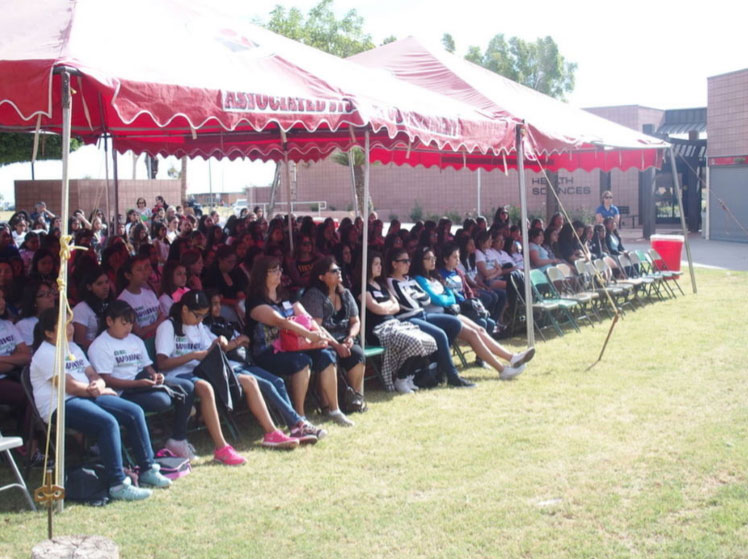
A crowd of young women listen to Imperial Valley College superintendent Victor Jaime (not pictured) during the welcome ceremony at the Expanding Your Horizons Science Technology Engineering Mathematics (STEM) Girls' Conference on Saturday at IVC. MICHAEL DUKES PHOTO
IMPERIAL - There are jobs to be had in the academic disciplines of science, technology, engineering and mathematics, and more young girls need to hear that.
Such was the platform of the first-ever Expanding Your Horizons STEM Girls' Conference held on the grounds of Imperial Valley College here Saturday, brought about by a coalition of the college, San Diego State University-Imperial Valley campus and CETYS Universidad of Mexicali.
Swollen numbers of participants spanning the middle and junior high school spectrum had their choice of 18 different workshops to attend, and keynote speaker Victoria Gastelum DeMatteis, an aerospace engineer with The Boeing Company, was on hand to offer up her own example as proof that anyone — no matter their ethnicity, economic background or gender — can seize the day.
"We're trying to encourage young women to think about occupations in science, technology, engineering and mathematics," said event organizer Lisa Rajigah, who alluded to a societal discouragement of female students to pursue career paths in the "more difficult" fields aforementioned. "There's a misperception that girls don't do well in math, for example, that it's something boys are better at, and that's been going around for years and being propagated."
Rajigah points to behavioral studies showing that as many girls reach preadolescence, a social anxiety disorder known as "center-of-the-stage phobia" takes root in them, meaning they are prone to withdraw from classroom participation. They may know the answers as often as the boys, Rajigah said, but because of these alleged environmental barriers — including stereotypes and gender bias — girls are less likely to raise their hands and volunteer an answer.
Academia must, therefore, reform and desist from blocking women's participation and progress in these fields, said Rajigah.
El Centro St. Mary's School seventh-grader Nicole Ye, 12, comes from a family of doctors and has her sights set on following in that legacy. Her friend Brianna Balli, also 12, is interested in computer graphics. Neither has noticed any particular bias or discouragement, but on their way to a seminar based on the duties of emergency room doctors — one of 18 offered — Ye said opportunities must always exist.
"If you don't get a lot of opportunities, you're not going to try hard to achieve your goals ," she stated.
Growing up in a fairly traditional Mexican family in Culiacan, Sinaloa, a young Gastelum DeMatteis thought heading her own accounting firm might be her highest achievement in life. Her passion for physics and mechanical engineering was first stoked by primary teachers, who motivated her to seek a degree in those fields.
She attended high school in Mexicali and went on to complete a degree in mechanical engineering at CETYS. In 2000, Gastelum DeMatteis obtained two master's degrees — another in her field of choice, and one in business — from the Massachusetts Institute of Technology.
She has since held multiple positions with Boeing but presently works as an aerospace engineer, helping to create a large program that will fundamentally transform functionality testing in modern aircraft.
"My path was dictated because I really love math and I was really good at it, but I also loved physics and science," she said. "I did very well in school and got a lot of motivation from my teachers, who opened my eyes to real opportunity."
However, Gastelum DeMatteis notes, her path was "not typical" and that "most of the time, women don't see it as a possibility." She believes, like Rajigah, that girls do not receive as much encouragement as their male classmates, but places such attitudes within the cultural context of smaller, close-knit societies.
Placing emphasis on outward mobility and higher education are things that parents "need to reconsider," Gastelum DeMatteis said, even if it means leaving home. "My parents always said … Wherever you can make a living and develop your talents, that's your land, that's your home."
Furthermore, women in STEM jobs tend to be more independent and vocationally satisfied. On average, they earn 33 percent more than those in non-STEM occupations. They have the chance to engage in some of the most exciting realms of discovery, Gastelum DeMatteis said, and increasing opportunities for women in these fields is a crucial step toward realizing equality across the board.
Staff Writer Michael Dukes can be reached at 760-337-3440 or at This email address is being protected from spambots. You need JavaScript enabled to view it.


